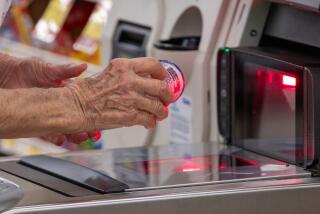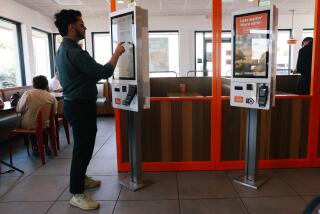Smart Cash Registers and Dumb People
- Share via
There seems to be some concern that as cash registers get smarter, the people behind them get less so.
Consumers complain that clerks can’t add up even two or three purchases without a register. A newspaper columnist writes of his encounter with a salesclerk who couldn’t “do 10%” of $28.86 in her head.
And a Los Angeles lawyer named George Schulman had to fight a McDonald’s clerk and her manager over the proper charge for two “Happy Meals” with milkshakes substituted for the provided drinks. It was computed several times, with different results. “Maybe the register can’t ring up something that’s not already in the computer,” says Schulman, “or maybe they were just unable to explain what they were doing.”
The sagging capability of American workers is neither news nor limited to retail counters. Overall, “the rate of increase in productivity has dropped dramatically” in this country since the 1970s, said the recent report of the Commission on the Skills of the American Workforce. The commissioners, from both industry and government, blamed, among other things, the poor education and training of front-line workers, and the fact that management would rather turn to machines or offshore workers than train them.
Our math skills in particular have been slipping. It has been reported that a quarter of American 13-year-olds don’t understand basic math principles, that American eighth-graders scored 13th among 17 nations in math and that the average Japanese 12th-grader is better at math than the top 5% of American 12th-graders.
The wonderful abilities of the machines further depress the operators’ abilities. As Emerson wrote in 1841, “The civilized man has built a coach, but has lost the use of his feet.”
Plain old cash registers are often computer terminals connected to a company’s mainframe. They do everything from registering sales to keeping track of inventory, leaving it to the employee just to punch in the item number, price, and amount tendered. Most machines even announce the correct change. “You don’t need math to operate the machine,” says Jim Cortese, spokesman for NCR (formerly National Cash Register) in Dayton, Ohio, “but you still have to count out the change.”
Many machines don’t even demand item number and price. Fast-food stores with limited menus may have machines with buttons describing each item, which automatically ring up the price when pushed. Big stores with a wide range of goods have scanners which read a bar code; again, the machine supplies the price.
With such machines, why should salespeople know math? Why, indeed, should children learn math procedures, wrote a New York math teacher (a teacher!) to Time magazine, “when a $4.95 calculator will do it more quickly and accurately?”
Cortese’s answer: “The issue is larger--it’s what learning those skills does to your brain, which needs software in it.”
Obviously, these machines have real advantages, having been developed not to depress everyone’s math skills but to automate retail sales procedure.
“They enable us to take care of customers a lot quicker, which improves the level of service,” says Rob Rohde, director of human resource planning and development for Sears Merchandise Group.
Salespeople can spend more time helping customers on the sales floor.
Machines also free people from the need to master certain skills. Many retail counter jobs are now open to the young, untrained, and uneducated. Fast-food restaurants, supermarkets and big merchandisers generally require neither proof nor exercise of arithmetic skills and in return, pay little.
Presumably, employees are freed to develop their abilities elsewhere, if still sales-directed.
“We used to spend half a day on the arithmetic part of it--how to figure out a discount, how to compute sales tax,” says Jack Fraser, vice president for human resources at the National Retail Federation in New York. “Now retailers can spend it on customer service.”
“The register does everything now,” says Aileen Gorman, spokesman for Boston-based Bradlees discount stores, which is installing scanners, along with a formal course in customer service for salespeople.
“They don’t have to do much thinking, but they do have to smile, to listen actively, to treat the customer with courtesy.”
Such civility training seems a limited enough goal, but even that is hardly widespread. Few managements even seem to be thinking of the new automation as offering benefits beyond better, faster sales processing.
It’s hard to find retailers using this freed-up time to train low-wage employees in anything.
“Only a handful of our companies invest in training,” said the Commission on the Skills of the American Workforce report, so low-paid workers are trapped in low-paid jobs.
It’s hard even to find retailers providing more customer service out on the floor: most just install computerized registers, cut their staffing, and save money.
Better machines make a better world, right?
More to Read
Inside the business of entertainment
The Wide Shot brings you news, analysis and insights on everything from streaming wars to production — and what it all means for the future.
You may occasionally receive promotional content from the Los Angeles Times.










